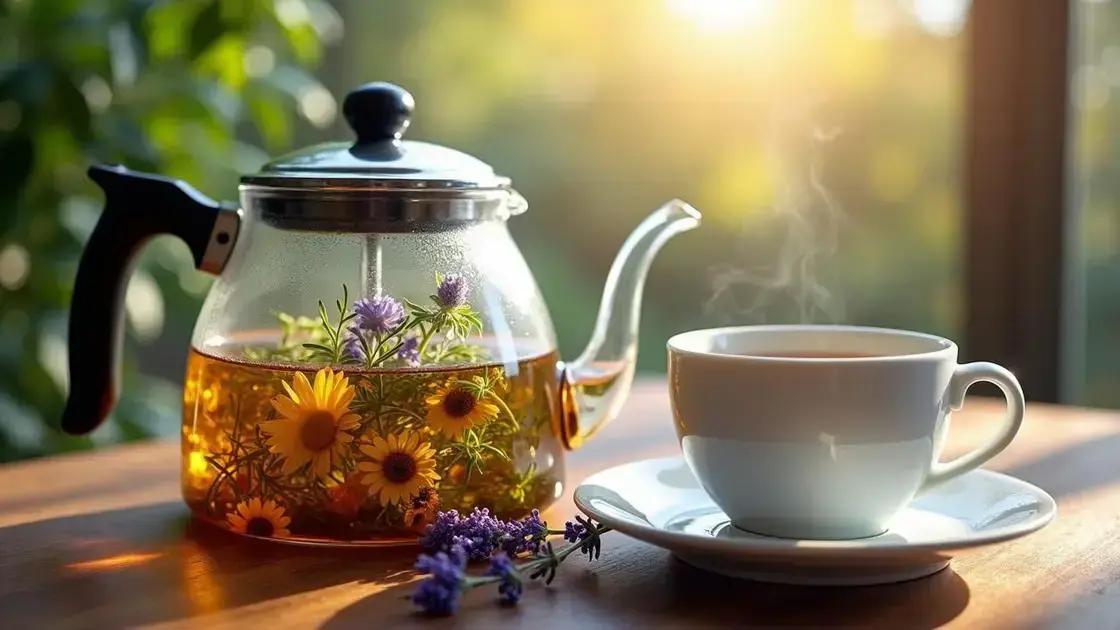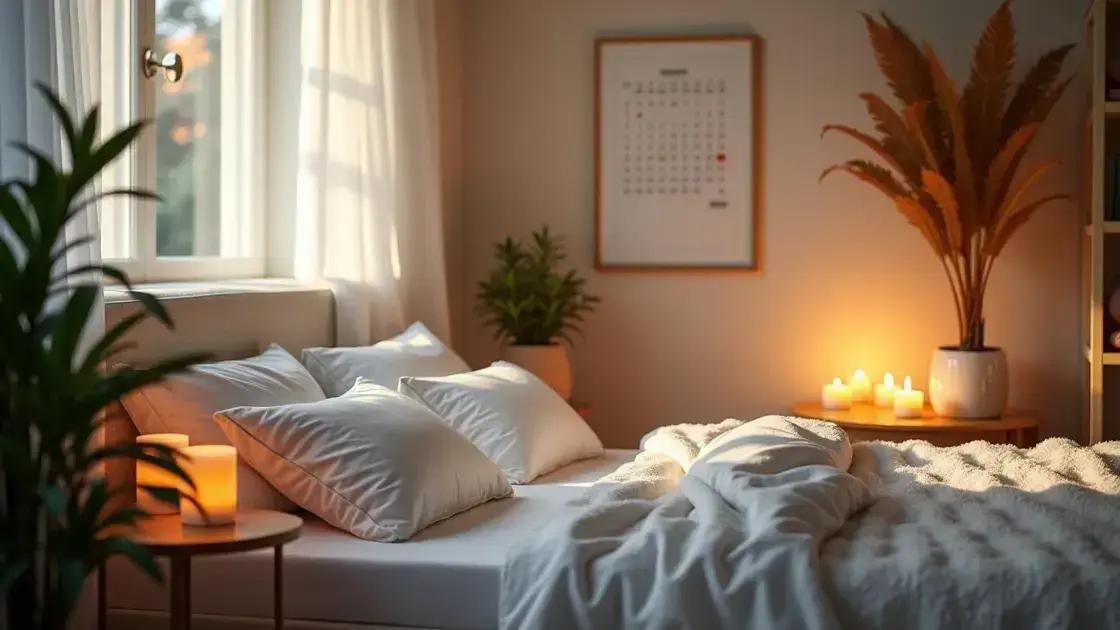To use herbal teas to support better sleep, choose calming varieties like chamomile or valerian root, brew them properly, and incorporate relaxing bedtime habits for improved sleep quality.
Struggling to get a good night’s sleep? Discover how to use herbal teas to support better sleep naturally. Herbal teas made from calming ingredients like chamomile and lavender can promote relaxation and prepare your body for rest. In this article, we’ll delve into the science behind these herbal infusions, explore the best types of herbal teas for sleep, and provide brewing tips to maximize their benefits.
The Science Behind Herbal Teas and Sleep

Understanding the science behind herbal teas and sleep can enhance your nightly routine. Many people struggle with sleep issues, and herbal teas are a natural option to promote relaxation and comfort.
How Herbal Teas Affect Sleep
Herbal teas contain various compounds that can impact your body and mind positively. Many herbs, such as chamomile, contain antioxidants like apigenin. This compound binds to receptors in the brain, reducing anxiety and promoting sleep.
The Role of Relaxation
When you sip herbal tea, the act itself can be a calming ritual. The warmth of the tea can soothe your body and mind. Research shows that warm beverages can help your body relax, easing you into a peaceful state.
Essential Compounds in Herbal Teas
Different herbs offer unique benefits. For instance, valerian root is known for its sedative effects, while lavender promotes relaxation through its pleasant aroma. Incorporating a variety of herbal teas can help address different sleep-related issues.
Impact of Caffeine
Many teas are naturally caffeine-free, making them an excellent choice for bedtime. Caffeine is a stimulant that can disrupt sleep patterns. By choosing herbal teas, you avoid caffeine’s negative effects, allowing you to achieve restful sleep.
Herbal teas have been used for centuries to assist with sleep. The growing interest in natural remedies has led to increased research backing their benefits, making them a popular choice for those seeking better sleep quality.
Top Herbal Teas for Improved Sleep Quality

When looking for the top herbal teas for improved sleep quality, several popular options stand out for their calming and soothing properties. Here are some of the best choices:
1. Chamomile Tea
Chamomile tea is one of the most famous herbal teas. It helps to relax the muscles and calm the mind. Many people enjoy sipping this tea before bedtime to promote a restful sleep.
2. Lavender Tea
Lavender is well-known for its soothing aroma. Drinking lavender tea can help reduce anxiety and lower stress levels, making it a perfect bedtime drink.
3. Valerian Root Tea
Valerian root is another popular choice. It is often used as a natural remedy for insomnia. This herbal tea can help shorten the time it takes to fall asleep and improve sleep quality overall.
4. Lemon Balm Tea
Lemon balm tea has a mild sedative effect. It can ease tension and anxiety, making it easier to fall asleep and stay asleep throughout the night.
5. Peppermint Tea
Peppermint tea, while not as calming as others, can aid digestion. A relaxed stomach can help you feel comfortable and ready for rest, complementing your sleep routine.
Incorporating these herbal teas into your evening routine can enhance your sleep experience. Each tea offers unique benefits and can cater to individual preferences, contributing to improved sleep quality.
How to Brew the Perfect Herbal Tea for Sleep

Brewing the perfect herbal tea for sleep involves a few simple steps that ensure maximum flavor and benefits. Follow these guidelines to make your ideal sleep-enhancing beverage.
1. Choose Your Herbal Tea
Select the herbal tea that best fits your needs. Popular options for sleep include chamomile, valerian root, and lavender. Each offers unique benefits to help you relax.
2. Measure the Ingredients
Using the right amount of herbs is crucial. Generally, use one teaspoon of dried herbs for every cup of water. For loose-leaf tea, one tablespoon for every three cups works well.
3. Boil Water
Heat fresh, filtered water to just below boiling point. This temperature is ideal for extracting the full range of flavors and benefits from your herbs. Boiling water can make some delicate herbs taste bitter.
4. Steep the Tea
Place the herbs in a tea infuser or directly in your cup. Pour hot water over the herbs and cover. Steeping for 5 to 10 minutes allows the herbal properties to infuse into the water.
5. Strain and Enjoy
If you used loose herbs, strain them out after steeping. Add a touch of honey or lemon if desired, then enjoy your warm cup of herbal tea in a relaxing environment. Creating a calming setting can enhance the tea’s effect.
By following these steps, you can brew the perfect herbal tea to help promote better sleep. Experiment with different herbs and steeping times to find your perfect blend.
Additional Sleep Tips for a Better Night’s Rest

To achieve a better night’s rest, consider incorporating additional sleep tips into your nighttime routine. These tips can complement herbal teas and enhance overall sleep quality.
1. Create a Sleep Schedule
Go to bed and wake up at the same time every day. Your body thrives on routine, and a consistent schedule helps regulate your internal clock for better sleep.
2. Make Your Bedroom Comfortable
Ensure your bedroom is cool, quiet, and dark. Consider investing in blackout curtains and a white noise machine. A comfortable mattress and pillows can also help you feel cozy and secure.
3. Limit Screen Time Before Bed
Reduce exposure to screens at least one hour before bedtime. The blue light emitted by phones, tablets, and computers can interfere with melatonin production, making it harder to fall asleep.
4. Free Your Mind with Relaxation Techniques
Try relaxation techniques such as deep breathing, meditation, or gentle yoga before bed. These practices can calm your mind and help release any tension from the day.
5. Avoid Heavy Meals and Caffeine
Avoid large meals, caffeine, and alcohol close to bedtime. Eating a heavy meal can cause discomfort and disrupt sleep, while caffeine keeps you awake. Aim for light snacks if you’re hungry.
By adopting these additional sleep tips, you can create a peaceful environment and routine that supports the benefits of herbal teas for a restful night’s sleep.
Enhancing Your Sleep with Herbal Teas
Incorporating herbal teas into your nighttime routine can significantly support better sleep. With options like chamomile, lavender, and valerian root, you can find the perfect brew to help you relax.
Alongside brewing tips, creating a comfortable sleep environment and adopting healthy habits can further enhance your sleep quality. Simple adjustments, like maintaining a regular sleep schedule and reducing screen time, can make a big difference.
By combining these practices with herbal teas, you can enjoy a restful night’s sleep and wake up refreshed each day. Explore the benefits of these natural remedies, and unlock the secret to better sleep.
FAQ – Frequently Asked Questions About Using Herbal Teas for Better Sleep
What are the best herbal teas for sleep?
Some of the best herbal teas for sleep include chamomile, lavender, valerian root, and lemon balm. Each offers unique calming benefits.
How do herbal teas promote better sleep?
Herbal teas can relax the mind and body, reduce anxiety, and help you wind down before bed, leading to improved sleep quality.
How should I brew herbal tea for sleep?
To brew the perfect herbal tea for sleep, use one teaspoon of dried herbs per cup of hot water. Steep for 5 to 10 minutes to maximize flavor and benefits.
Can herbal teas interact with medications?
Yes, some herbal teas can interact with certain medications. It’s important to consult with your healthcare provider before adding new herbal remedies to your routine.
Are there other tips to improve sleep quality?
Yes, additional tips include maintaining a consistent sleep schedule, creating a comfortable sleep environment, and limiting screen time before bed.
How close to bedtime should I drink herbal tea?
It’s best to drink herbal tea about 30 to 60 minutes before bedtime to allow your body to relax and prepare for sleep.












